Analysis: GOP’s long-term Supreme Court strategy pays off
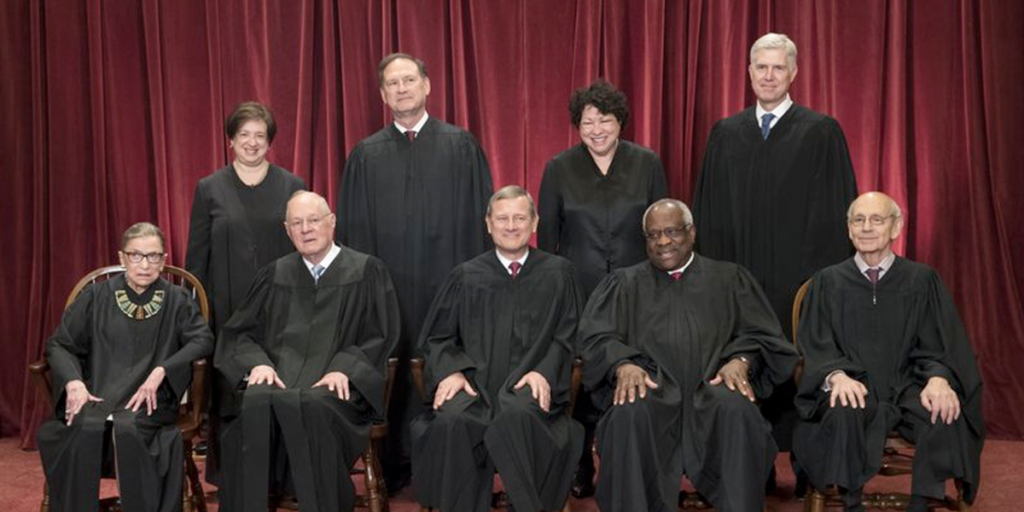
Three years of political upheaval. Early morning Twitter blasts. Scores of startling headlines. For the Republican Party, all the chaos of the Trump era has been building toward a week like this. The party’s long-term strategy to focus on the Supreme Court — highlighted by an audacious decision not to allow a vote in 2016 on President Barack Obama’s judicial pick — culminated this week with a series of conservative rulings and another vacancy. With Justice Anthony Kennedy set to retire at the end of next month, President Donald Trump is poised to appoint his second justice in as many years, giving conservatives a potential bulwark on the bench that could offset national demographic trends that appear set to favor Democrats in the decades ahead. Though Trump, who has little fixed ideology, has been an unpredictable and at times frustrating governing partner for the Republican leadership, he has largely adhered to GOP orthodoxy when it comes to judicial appointments, including his selection of Neil Gorsuch for the Supreme Court a year ago. And the president, in the moments after Kennedy’s retirement was announced, made clear that he understood the opportunity to shape the court for generations. “It’s always been considered a tremendous — a tremendously important thing,” the president said at the White House on Wednesday. “Some people think outside of, obviously, war and peace, it’s the most important thing that you could have.” White House aides signaled the president would look to quickly move toward announcing a nomination. And Senate Republicans said they would be willing to hold a confirmation vote this fall to replace Kennedy, a perennial swing vote on the court, despite Democratic cries of hypocrisy since the GOP refused to hold hearings on Obama’s choice of Merrick Garland because it was an election year. Kennedy’s retirement sets up a monumental confirmation fight and raises the stakes even higher for the November midterm elections, in a campaign season that already featured the future of the Supreme Court as a defining issue after several significant rulings in recent days. The court’s conservative majority asserted itself on Trump’s travel ban, worker rights, voting rights and religious freedom. With the White House reeling after a week’s worth of heart-wrenching images of forced family separations at the southern border, the court’s support for the travel ban gave Trump a welcome boost and is sure to embolden him in pressing hard-line immigration policies heading into the midterms. Though the ruling was at its heart a defense of executive powers, the president took it as affirmation of the hawkish policies and incendiary rhetoric he unveiled in his June 2015 campaign kickoff and now wants at the heart of the GOP’s efforts this November. The court also ruled on a cause celebre for the right, as Kennedy — despite his long history of supporting gay rights — wrote the court’s 7-2 opinion on narrow grounds that absolved a Colorado baker of discrimination for refusing to create a wedding cake for a same-sex couple. Moreover, the court overruled a 41-year-old precedent that allowed public employee unions to collect fees from non-members, a decision viewed as a major blow for Democrats. Liberals compared that ruling to the 2010 decision that let corporations spend unlimited amounts on elections and the 2013 ruling that struck down a key section of the Voting Rights Act as actions that could fundamentally change how campaigns are waged and votes are cast. A 2018 study released as a National Bureau of Economic Research paper found that states with right-to-work laws that weaken unions reduce the vote shares of Democratic presidential candidates by 3.5 percentage points. Sen. Mitch McConnell said Wednesday that the Senate “stands ready” to swiftly move on Trump’s impending choice and added that “it’s imperative that the president’s nominee be treated fairly.” Democrats immediately cried foul and accused the GOP of a double standard. “Our Republican colleagues in the Senate should follow the rule they set in 2016: Not to consider a Supreme Court justice in an election year,” said Senate Minority Leader Chuck Schumer. But Republicans appeared unbowed. Installing conservative justices has long been paramount to the GOP, a sentiment that only accelerated after the power of the court was on full display with the 2000 decision that ruled in favor of George W. Bush’s right to the presidency. In 2013, McConnell, then minority leader, cautioned Democrat Harry Reid not to invoke the “nuclear option” — lowering the vote threshold for confirmation of judges and Cabinet officials from 60 to 51 votes. Since becoming majority leader, McConnell has held Supreme Court justices to the same lower threshold. But the centerpiece of the GOP plan was McConnell’s refusal to hold hearings for Garland after Justice Antonin Scalia’s death in February 2016. Though the precedent had held that new justices be seated even in election years, McConnell kept the spot open on the bet that a Republican could win that November — even if that Republican were Donald Trump. A court seat being on the line proved a powerful incentive for Republicans that fall, many willing to set aside their distaste for Trump’s personal failings and incendiary rhetoric in order to add a conservative to the court. Trump himself took the unusual step of publicly releasing a list of Supreme Court candidates, most of whom were traditional jurists that many Republicans believed would uphold conservative values. Since his election, the president has often acted as a thorn in Republicans’ side, frequently breaking with GOP dogma while attacking members of his own party, including McConnell. Their reward is another GOP pick for the court, and Trump suggested that he would again nominate someone Republicans would cheer. “We have a very excellent list of great talent and highly educated, highly intelligent, hopefully tremendous people,” Trump said. “It will be somebody from that list.” Republished with permission from the Associated Press.
Donald Trump’s list of possible SCOTUS nominees include two from Alabama
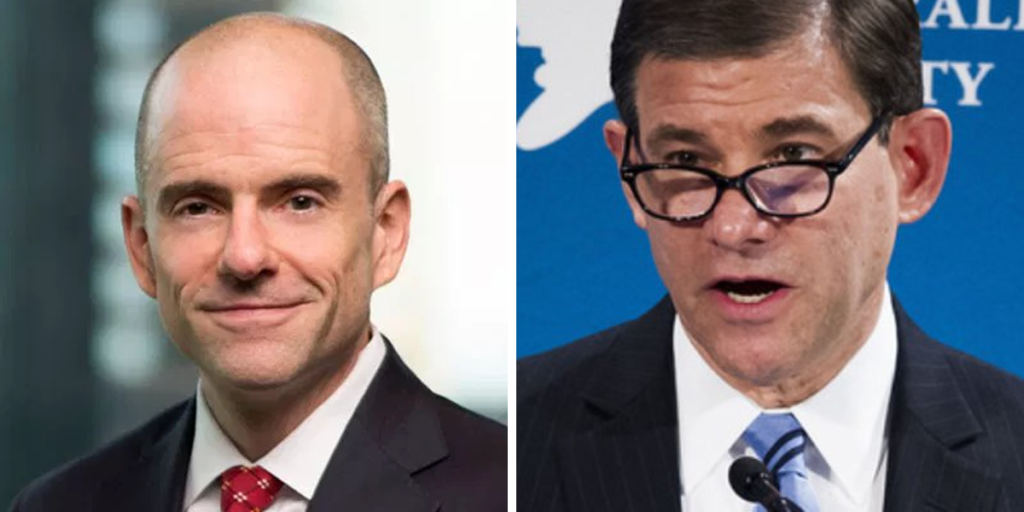
Justice Anthony Kennedy, a member of the Supreme Court, announced Wednesday he will retire, giving President Donald Trump his second opportunity to fill a seat on the high court. According to a senior White House staffer, Trump is choosing his nominee from a list of 25 well-qualified judges. William Pryor Among them is Judge William Pryor. An Alabama-based judge on the 11th U.S. Circuit Court of Appeals, who met with Trump back in January 2017 before he ultimately selected Neil Gorsuch for the seat. His resume is impressive too. He was Alabama’s attorney general from 1997 to 2004. He’s also is a member of the U.S. Sentencing Commission, an independent agency that sets sentencing guidelines for the federal courts. Also in his corner is his opinion on Roe v. Wade. Kennedy often supported abortion rights during his time on the court, and Trump wants to choose justice who want to overturn the landmark abortion rights case, and Pryor once called the 1973 decision, the “worst abomination in the history of constitutional law.” He’s also a prime age for a potential nominee 54. Typically, presidents seek nominees who have the potential for a long tenure in the lifetime appointment, and thus look for nominees under 60 years old. Kevin Newsom 45-year-old Birmingham attorney Kevin Newsom was nominated by Trump to the U.S. Court of Appeals for the 11th Circuit back in May 2017. Alabama’s former solicitor general, who prior to his confirmation chaired the appellate group at Bradley Arant Boult Cummings in Birmingham, is also on Trump’s possible SCOTUS nominee list. He graduated from Harvard Law School in 1997, where he served as Harvard Law Review’s articles editor. He earned his undergraduate degree at Birmingham’s Samford University in 1994, graduating summa cum laude with a 4.0. After graduating law school, Newsom clerked for Judge Diarmuid O’Scannlain of the U.S. Court of Appeals for the 9th Circuit, and then for U.S. Supreme Court Justice David Souter from 2000-2001. Newsom later joined Covington & Burling’s Washington-based appellate litigation practice group, where he served for two years before becoming Alabama solicitor general in 2003, appointed by then-Alabama Attorney General Bill Pryor. In 2004, Pryor was named to the 11th Circuit, and was on Trump’s list of potential U.S. Supreme Court nominees. A biography online says Newsom personally argued four cases before the U.S. Supreme Court, and over 19 federal appellate court cases, as well as several in state appellate courts. In 2007, Newsom stepped down as solicitor general to join Bradley Arant, calling the “the SG gig … the job of a lifetime.” Others Below are the 25 names of possible contenders for the vacancy being considered by the President: Amy Coney Barrett of Indiana, U.S. Court of Appeals for the Seventh Circuit Keith Blackwell of Georgia, Supreme Court of Georgia Charles Canady of Florida, Supreme Court of Florida Steven Colloton of Iowa, U.S. Court of Appeals for the Eighth Circuit Allison Eid of Colorado, U.S. Court of Appeals for the Tenth Circuit Britt Grant of Georgia, Supreme Court of Georgia Raymond Gruender of Missouri, U.S. Court of Appeals for the Eighth Circuit Thomas Hardiman of Pennsylvania, U.S. Court of Appeals for the Third Circuit Brett Kavanaugh of Maryland, U.S. Court of Appeals for the District of Columbia Circuit Raymond Kethledge of Michigan, U.S. Court of Appeals for the Sixth Circuit Joan Larsen of Michigan, U.S. Court of Appeals for the Sixth Circuit Mike Lee of Utah, United States Senator Thomas Lee of Utah, Supreme Court of Utah Edward Mansfield of Iowa, Supreme Court of Iowa Federico Moreno of Florida, U.S. District Court for the Southern District of Florida Kevin Newsom of Alabama, U.S. Court of Appeals for the Eleventh Circuit William Pryor of Alabama, U.S. Court of Appeals for the Eleventh Circuit Margaret Ryan of Virginia, U.S. Court of Appeals for the Armed Forces David Stras of Minnesota, U.S. Court of Appeals for the Eighth Circuit Diane Sykes of Wisconsin, U.S. Court of Appeals for the Seventh Circuit Amul Thapar of Kentucky, U.S. Court of Appeals for the Sixth Circuit Timothy Tymkovich of Colorado, U.S. Court of Appeals for the Tenth Circuit Robert Young of Michigan, Supreme Court of Michigan (Ret.) Don Willett of Texas, Supreme Court of Texas Patrick Wyrick of Oklahoma, Supreme Court of Oklahoma
Supreme Court deals big setback to labor unions
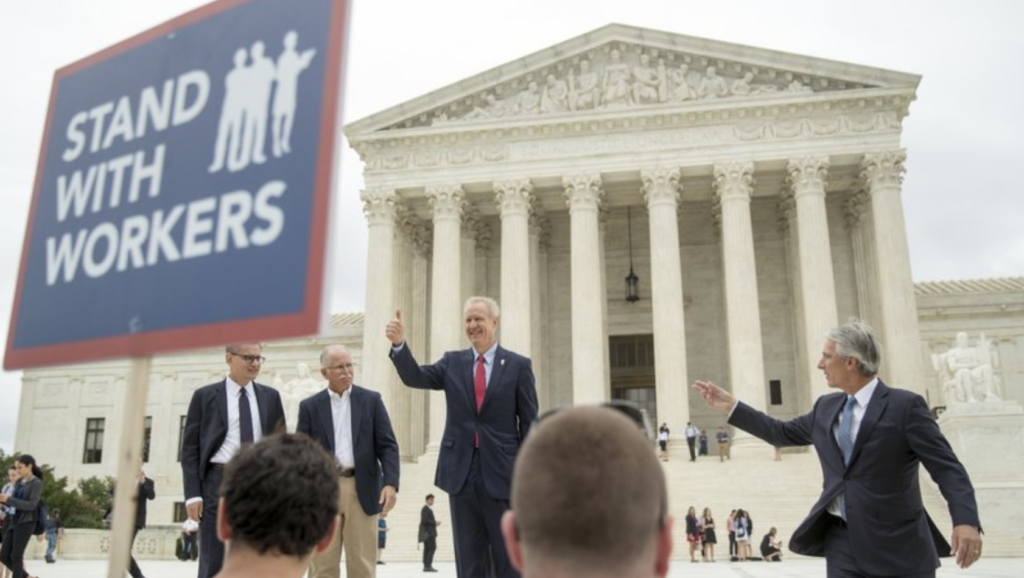
The Supreme Court ruled Wednesday that government workers can’t be forced to contribute to labor unions that represent them in collective bargaining, dealing a serious financial blow to Democratic-leaning organized labor. The court’s conservative majority, re-empowered by Justice Neil Gorsuch, scrapped a 41-year-old decision that had allowed states to require that public employees pay some fees to unions that represent them, even if the workers choose not to join. The 5-4 decision not only will free non-union members in nearly two dozen states from any financial ties to unions, but also could encourage members to stop paying dues for services the court said Wednesday they can get for free. Union leaders said in reaction to the ruling that they expect to suffer some loss of revenue and also predicted that the same anti-union forces that pushed to get rid of the so-called fair shares that non-members had to pay will try to persuade members to cut their ties. “There are already plans,” said Lily Eskelsen García, president of the National Education Association. “They are going after our members.” But American Federation of Teachers President Randi Weingarten said unions would not be dissuaded: “Don’t count us out The labor leaders spoke after the court ruled that the laws requiring fair share fees violate the First Amendment by compelling workers to support unions they may disagree with. “States and public-sector unions may no longer extract agency fees from nonconsenting employees,” Justice Samuel Alito said in his majority opinion in the latest case in which Gorsuch, an appointee of President Donald Trump, provided a key fifth vote for a conservative outcome. Trump himself tweeted his approval of the decision while Alito still was reading a summary of it from the bench. “Big loss for the coffers of the Democrats!” Trump said in the tweet. In dissent, Justice Elena Kagan wrote of the big impact of the decision. “There is no sugarcoating today’s opinion. The majority overthrows a decision entrenched in this Nation’s law – and its economic life – for over 40 years. As a result, it prevents the American people, acting through their state and local officials, from making important choices about workplace governance. And it does so by weaponizing the First Amendment, in a way that unleashes judges, now and in the future, to intervene in economic and regulatory policy.” The court’s three other liberal justices joined the dissent. In one sense, Wednesday’s result was no surprise and merely delayed by the unexpected death of Justice Antonin Scalia in 2016. The court split 4-4, after Scalia’s death, when it considered the same issue in 2016. When Trump was elected, opponents of the fees hurried a case back to the court. And fearing what would happen, unions strongly opposed Gorsuch’s nomination to the high court. The unions say the outcome could affect more than 5 million government workers in about two dozen states and the District of Columbia. The case decided Wednesday involved Illinois state government worker Mark Janus, who argued that everything unions do, including bargaining with the state, is political and employees should not be forced to pay for it. The unions argued that so-called fair share fees pay for collective bargaining and other work the union does on behalf of all employees, not just its members. More than half the states already have right-to-work laws banning mandatory fees, but most members of public-employee unions are concentrated in states that don’t, including California, New York and Illinois. A recent study by Frank Manzo of the Illinois Economic Policy Institute and Robert Bruno of the University of Illinois at Urbana-Champaign estimated that public-sector unions could lose more than 700,000 members over time as a result of the ruling and that unions also could suffer a loss of political influence that could depress wages as well. Alito acknowledged that unions could “experience unpleasant transition costs in the short term.” But he said labor’s problems pale in comparison to “the considerable windfall that unions have received…for the past 41 years.” Billions of dollars have been taken from workers who were not union members in that time, he said. “Those unconstitutional exactions cannot be allowed to continue indefinitely,” Alito wrote. Kagan, reading a summary of her dissent in the courtroom, said unions only could collect money for the costs of negotiating terms of employment. “But no part of those fees could go to any of the union’s political or ideological activities,” she said. The court’s majority said public-sector unions aren’t entitled to any money from employees without their consent. Republished with permission from the Associated Press.
Justice Anthony Kennedy retiring; Donald Trump gets 2nd Supreme Court pick
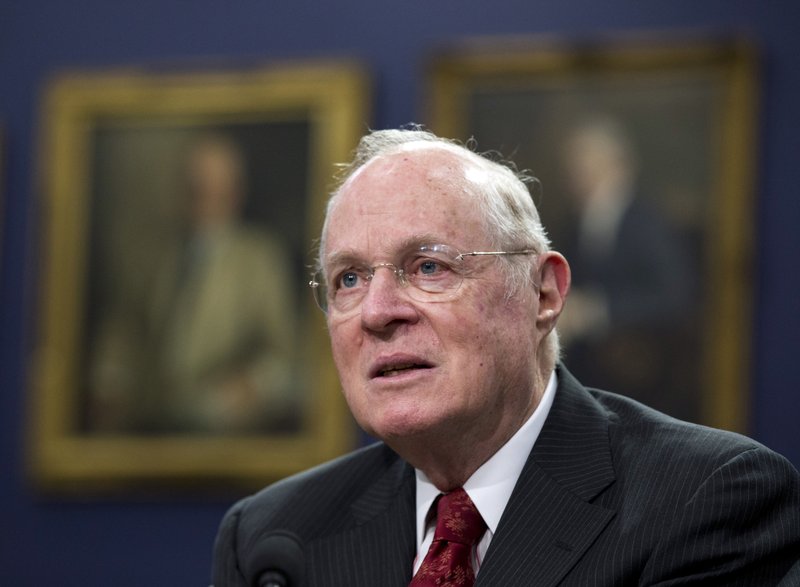
Supreme Court Justice Anthony Kennedy announced his retirement Wednesday, giving President Donald Trump the chance to cement conservative control of the high court. The 81-year-old Kennedy said in a statement he is stepping down after more than 30 years on the court. A Republican appointee, he has held the key vote on such high-profile issues as abortion, affirmative action, gay rights, guns, campaign finance and voting rights. Kennedy said he has informed his colleagues and Trump of his plans, and that his retirement will take effect at the end of July. Without him, the court will be split between four liberal justices who were appointed by Democratic presidents and four conservatives who were named by Republicans. Trump’s nominee is likely to give the conservatives a solid majority and will face a Senate process in which Republicans hold the slimmest majority, but Democrats can’t delay confirmation. Trump’s first high court nominee, Justice Neil Gorsuch, was confirmed in April 2017. If past practice is any indication, Trump will name a nominee within weeks, setting in motion a process that could allow confirmation of a new justice by early August. Trump already has a list of 25 candidates — 24 judges and Utah Sen. Mike Lee — from which the White House has previously said he would choose a nominee. Prominent on that list are Judges Thomas Hardiman of Pennsylvania and William Pryor of Alabama, seriously considered for the seat eventually filled by Justice Neil Gorsuch, and Judge Brett Kavanaugh, who serves on the federal appeals court in Washington, DC. Kavanaugh is a longtime Washington insider, having served as a law clerk to Kennedy and then as a key member of independent counsel Kenneth Starr’s team that produced the report that served as the basis for President Bill Clinton’s impeachment. In October, Kavanaugh dissented when his court ruled that an undocumented teen in federal custody should be able to obtain an abortion immediately. Abortion is likely to be one of the flash points in the nomination fight. Kennedy has mainly supported abortion rights in his time on the court, and Trump has made clear he would try to choose justices who want to overturn the landmark abortion rights case of Roe v. Wade. Such a dramatic step may not be immediately likely, but a more conservative court might be more willing to sustain abortion restrictions. Interest groups across the political spectrum are expected to mobilize to support and fight the nomination because it is so likely to push the court to the right. Republicans currently hold a bare 51-49 majority in the Senate, although that includes the ailing Sen. John McCain of Arizona. If Democrats stand united in opposition to Trump’s choice, Senate Majority Leader Mitch McConnell of Kentucky can lose no more than one vote. If the Senate divides 50-50, Vice President Mike Pence could break a tie to confirm the nominee. Regardless of who replaces him, Kennedy’s departure will be a massive change for the high court, where he has been the crucial swing vote for more than a decade. He has sided with the liberal justices on gay rights and abortion rights, as well as some cases involving race, the death penalty and the rights of people detained without charges at the Guantanamo Bay naval base. He has written all the court’s major gay-rights decisions, including the 2015 ruling that declared same-sex marriage is a constitutional right nationwide. He also has been a key vote when conservatives have won major rulings on the outcome of the 2000 presidential election in favor of George W. Bush, gun rights, limiting regulation of campaign money and gutting a key provision of the landmark federal Voting Rights Act. There were no outward signs that Kennedy was getting ready to retire. He had hired his allotment of four law clerks for the term that begins in October and he is planning to spend part of the summer as he typically does, teaching a law school class in Salzburg, Austria. But several former law clerks said that Kennedy, a nominee of President Ronald Reagan, prefers to be replaced by a Republican. Control of the Senate is at stake in the November elections, and if Democrats capture the majority, Trump could find it difficult to get his choice confirmed. Few obstacles seem to stand in the way of confirming Kennedy’s replacement before the court reconvenes in October. Republicans changed the rules during Gorsuch’s confirmation to wipe out the main delaying tactic for Supreme Court nominees, the filibuster, and the need for 60 votes to defeat it. The other two older justices, Ruth Bader Ginsburg, 85, and Stephen Breyer, 79, are Democratic appointees who would not appear to be going anywhere during a Trump administration if they can help it. Republished with permission from the Associated Press.
Alabama politicians, groups react to Supreme Court decision on Donald Trump’s travel ban
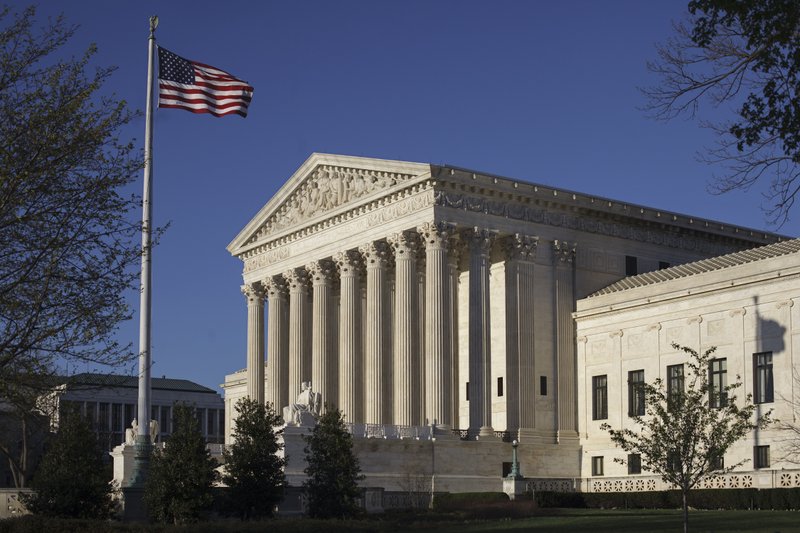
The Supreme Court of the United States ruled in favor of the Trump Administration’s travel ban, which prohibits travel from seven countries: Libya, Syria, North Korea, Iran, Somalia, Yemen and Venezuela. In a 5-4 decision, the court reversed an injunction that had — until December 2017 — prevented the Trump administration from using the Travel Ban 3.0 as a basis for denying visas to foreign nationals from the affected countries. Here are their reactions (in order received/seen online): Terry Lathan | Chairman of the Alabama Republican Party (ALGOP) The Constitution has clearly given a president the authority to implement executive orders. The travel ban pertaining to several countries was in that scope. This is not a policy on discrimination- it is a policy on the security of our nation. Chief Justice John Roberts was correct when he authored that the ruling was ‘squarely within the scope of presidential authority’ under our federal laws. We applaud the Supreme Court’s decision on this matter. Alabama 3rd District U.S. Rep. Mike Rogers: I was thrilled today to see the Supreme Court uphold President Trump’s travel ban. It is a huge win for the safety of the American people and our national security. President Trump is exactly right that we must fully vet people from these countries before even considering to allow them into the United States. Keeping Americans safe is one of the highest duties of the government and this was absolutely the right decision. Alabama 5th District U.S. Rep. Mo Brooks: I applaud the Supreme Court for finding that President Trump has authority to take such actions as are necessary to protect American lives from terrorism risks. America is safer as a result. The President’s legal authority on immigration and national security in this instance is clear. The liberal, judicially activist 9th Circuit, the most error-prone and reversed circuit court of appeal, unnecessarily put American lives at risk when it undermined the President’s Constitutional authority to protect Americans. I am pleased the Supreme Court overturned the 9th Circuit’s liberal, activist, and unconstitutional overreach. I fully supported President Trump when he issued the Travel Order Proclamation and I fully support the President’s continued actions to protect American lives. Today’s decision is a win for the Rule of Law. Alabama 7th District U.S. Rep. Terri Sewell: Today’s Supreme Court ruling upholding the Muslim travel ban takes our country in the wrong direction. America was built on the promise of freedom and opportunity for immigrants of all backgrounds, regardless of religion. Trump’s own statements on the purpose of his Muslim ban are evidence of the religious discrimination that his Muslim ban is founded on. While the President has authority to protect our national security, promoting blatant religious discrimination only undermines our interests abroad and our security at home. Trump’s Muslim ban does not make our country safer. Instead, it weakens our fight against terror by handing extremists a tool for recruitment and alienating Muslim partners around the globe. Additionally, the ban robs our nation of the economic input of immigrants, who are business owners, community leaders, students, and workers in our communities. Policies that discourage foreign investments in and partnerships with our country should be rejected by all who care about the long-term standing of the United States as a global leader. It is time for this Congress to hold the Trump Administration accountable for its dangerous, anti-family, anti-immigrant policies. CAIR-Alabama | Executive Director Khaula Hadeed Today’s decision deeply impacts Muslim communities and communities of color. This is not the first time the Court has been wrong on a decision. In Korematsu the Court permitted the incarceration of thousands of people based on their Japanese ancestry. In this case, Trump set out to ban Muslims from entering the country and the Court permitted him to do so. This decision empowers the president and future administrations to discriminate on the basis of religion. Randall Woodfin | Mayor of Birmingham America was founded by immigrants. It was built by immigrants. Yet the Supreme Court’s travel ban ruling undermines an entire group of people based on their religious beliefs. This is not who we are. America was built on the idea that people from all walks of life could come together and live in harmony. President Trump’s statements over the past few years demonstrate purposeful intent to deny our Muslim brothers and sisters the rights enjoyed by everyone within our borders. Birmingham taught the world the meaning of equality and tolerance. This is not it.
Parker Snider: Three years after Obergefell
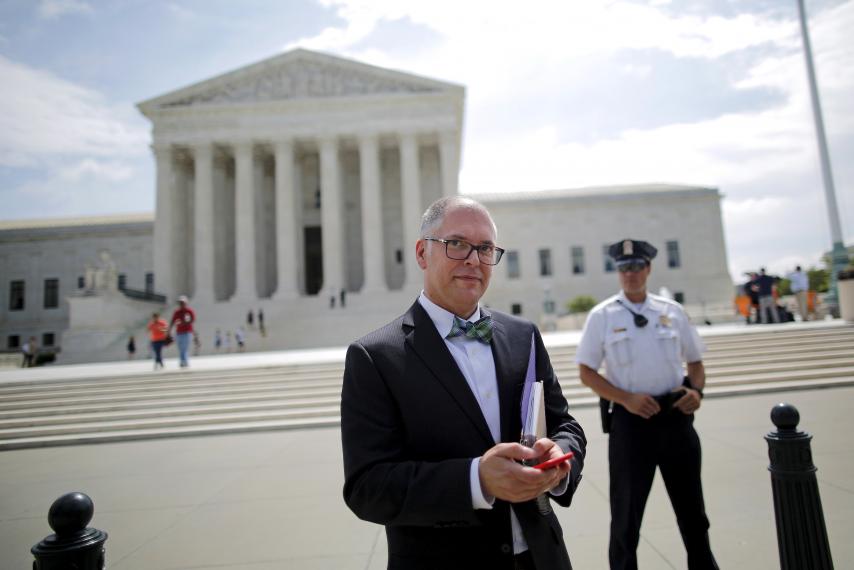
In June of 2015, same-sex marriage became legal in all fifty states. The Supreme Court ruled in the Obergefell v. Hodges case in favor of Jim Obergefell, whose marriage in Maryland was not recognized in Ohio. Unexpected to most, exciting to some and alarming to others, the Obergefell ruling was hailed as monumental, final, and as historic as Brown v. Board of Education or Roe v. Wade. It’s been three years now. A lot hasn’t changed: Alabama is still good at football, Tom Cruise is still making Mission Impossible movies, and our state’s U.S. House of Representatives delegation is still legislating. Some things, however, have changed – including the public opinion of gay marriage. From 2015 to 2017, the percentage of Americans that favored same-sex marriage increased from 55 to 62 percent. What was in 2012 opposed by most Americans is now accepted by almost two-thirds of Americans. That number won’t be going down any time soon. The approval rate of same-sex marriage by millennials is just shy of 75% and still increasing. Same-sex marriage faces most of its opposition in those born before 1946, and even that approval rate is nearing the 50% mark. Clearly, same-sex marriage is approaching complete normalization in the United States. What is less clear, though, is the further impact—beyond the legalization of same-sex marriage—this normalization will have on the future. Conservative pundits everywhere asked the “what’s next?” question concerning same-sex marriage before Obergefell, suggesting polygamy and the surely-to-be-legalized ability to “marry a turtle” (a direct quote from Sean Hannity). Regardless of whether these suggestions are likely, I tend to look to Europe to see what social movement might come next to America instead of the musings of political personalities. In Europe, polygamy and animal marriage is still illegal. What is happening in Europe, however, is a disturbing movement against religious liberty. For example, the Council of Europe determined in 2007 that their definition of human rights must supersede “any religious principle”, creating clear problems for both Christians and Muslims who would refuse to officiate a same-sex marriage. France’s burqa ban, a law disallowing Muslim women from wearing certain religious clothing, is still on the books, and the Court of Justice of the European Union recently ruled that many private employers can ban religious symbols from the workplace. Even more worrisome is the fact that Ireland’s prime minister recently promised that many Catholic hospitals will be forced to provide abortions. Unfortunately, we already see shadows of the European reality within our borders. Attempts to force Christian bakers to create cakes for same-sex marriages, nuns to pay for birth control, and Christian colleges to approve of same-sex relationships demonstrate that Americans must be ready to protect religious liberty. One year after the Obergefell ruling, in the summer of 2016, I stumbled upon Jim Obergefell. He, along with others, was a witness in a House Oversight Committee Hearing I was attending. I was, admittedly, surprised to be in the same room as the man largely responsible for the legalization of same-sex marriage and somewhat apprehensive to the idea of speaking with him. In my interactions with him, however, Mr. Obergefell did not seem to be an anti-Christian warrior but instead a gracious and kind man. To my surprise and confusion, I saw no desire in him to eliminate Christianity or even any animosity towards Christians. Meeting Jim Obergefell showed me something important: most people are not fighting against something, but for something. They’re not angry, they’re hopeful, and genuinely trying to make the world a better place. That reality is a gift for those of us who want a solution. Three years after Obergefell, Americans should expect conflicts between religious liberty and the right to same-sex marriage created in 2015. When they come, we must work not towards a binary win-lose solution but for one that allows these two foundational American principles—religious liberty and individual freedom—to flourish together. ••• Parker Snider is Policy Relations Manager for the Alabama Policy Institute (API). API is an independent, nonpartisan, nonprofit research and educational organization dedicated to strengthening free enterprise, defending limited government, and championing strong families. If you would like to speak with the author, please e-mail communications@alabamapolicy.org or call (205) 870-9900.
Here’s what the SCOTUS ruling that states can collect online sales tax means for Alabama

In a decision that will impact online shopping for all Alabamians, on Thursday the U.S. Supreme Court upheld a South Dakota law that required online companies to collect and remit state sales taxes, even if that company did not have a ‘physical presence’ in the state. In the landmark ruling, the court reversed a 26-year-old decision and in saying that states can require internet retailers to collect sales and use tax in states where they lack a physical presence. In Alabama Alabama is expected to be among the states most likely to see the biggest percentage increase in revenue based on the Barclays research. The ruling is likely to lead the Yellowhammer State to collect sales tax on purchases from out-of-state online businesses more aggressively. Translation: many consumers will likely pay more at the online checkout. History behind the opinion Justice Anthony Kennedy, who wrote the majority opinion in the 5-4 decision, said the 1992 decision, known as Quill, resulted in “a judicially created tax shelter for businesses that decide to limit their physical presence and still sell their goods and services to a state’s consumers — something that has become easier and more prevalent as technology has advanced.” According to the U.S. Census Bureau, from 1992 to 2018 internet and mobile sales have grown from zero to nine percent of all retail sales. Online sales are growing at four times the rate of total retail sales – 16 percent vs. 4.4 percent. The pre-internet era physical presence rule put “local businesses … at a competitive disadvantage relative to remote sellers,” and it “produced an incentive to avoid physical presence in multiple states,” Kennedy wrote in his opinion. Prior to the SCOTUS ruling In 2015, Alabama was looking for a solution to the problems they were encountering due to the Quill decision. That year, the Alabama Department of Revenue (ADOR) adopted a Simplified Sellers Use Tax program (SSUT) that took effect October 22: “Pursuant to this rule, an out-of-state seller with a substantial economic presence in Alabama will be required to collect and remit Alabama tax on its sales into the state, regardless of whether it has an Alabama physical presence. The rule imposes a collection obligation on out-of-state sellers who engage in one or more of the activities listed in Code of Alabama 1975, Section 40-23-68, activities subjecting out-of-state sellers to the state’s sellers use tax levy, and who had $250,000 or more in retail sales sold into Alabama in the previous year. Out-of-state sellers may satisfy the rule’s requirements by collecting, reporting and remitting tax on sales made into Alabama pursuant to the provisions of Article 2, Chapter 23 of Title 40, Code of Alabama 1975, or by participating in the Simplified Sellers Use Tax Remittance Program.” SSUT allowed, and continues to do so, participating sellers to collect, report, and remit an eight percent simplified sellers use tax on sales of tangible personal property delivered to Alabama purchasers, covering both state and local taxes. If SSUT is collected, neither the purchaser or the seller are liable for any additional use taxes on the transaction, regardless of whether the actual combined local and state rate is higher than eight percent. Before the SSUT was launched in 2015, online sellers with no physical presence in the state had no obligation to collect and remit use taxes on sales made within the state. Not only did this result in millions of dollars of revenue lost, but it also meant that brick-and-mortar retailers in the state, who did collect and remit sales tax, were at a disadvantage. In April 2018, Gov. Kay Ivey signed into law HB470, which amended the 2015 SSUT law by requiring online marketplaces to collect and remit use taxes on sales made through their marketplaces by third-party sellers, or to report such sales to the Alabama Department of Revenue and notify customers of use tax obligations. The legislation also allows existing sellers participating in the SSUT that establish a physical presence in this state, only through the acquisition of an in-state business, to continue to participate in the SSUT program. What the changes mean for Alabama? Since it’s inception, approximately 185 online vendors have voluntarily joined the state’s SSUT program. They are protected from a change in the physical presence rule. Only if the change in law is caused by “the enactment of federal legislation” is their grandfather protection voided (see Ala. Code § 40-23-191 et seq.). What they’re saying “The U.S. Supreme Court has ruled that online-only sellers should have to play by the same rules that in-state retailers do. Local retailers have been playing by the rules and collecting state sales tax on every purchase, every year since the Supreme Court’s original decision,” said Rick Brown, president of the Alabama Retail Association. “This is a victory for Alabama’s Main Street retailers. No longer will the federal government select winners and losers in the retail industry. Our 4,200 retail members and our association have advocated for this decision for decades.” Brown added, “Out-of-state, online-only businesses will no longer have an unfair advantage over our friends and neighbors who own local businesses. This ruling clears the way for a fair and level playing field where all retailers compete under the same sales tax rules whether they sell merchandise online, in-store or both.” Ivey says the decision “will promote parity between our state’s brick and mortar businesses and competing out-of-state sellers.” “Technology and the advent of e-commerce has drastically changed the retail landscape and the states’ ability to collect sales taxes. The Supreme Court’s ruling related to online sales taxes is a common-sense approach that modernizes existing limitations on the taxation of e-commerce sales and will facilitate collections in our global, technology-driven economy,” said Ivey. “The change effected by the Court’s decision will promote parity between our state’s brick and mortar businesses and competing out-of-state sellers.” ADOR has not responded to request for comment at the time of publishing. *This article will be updated as the decision is reviewed further.
US Supreme Court says online shoppers can be forced to pay sales tax
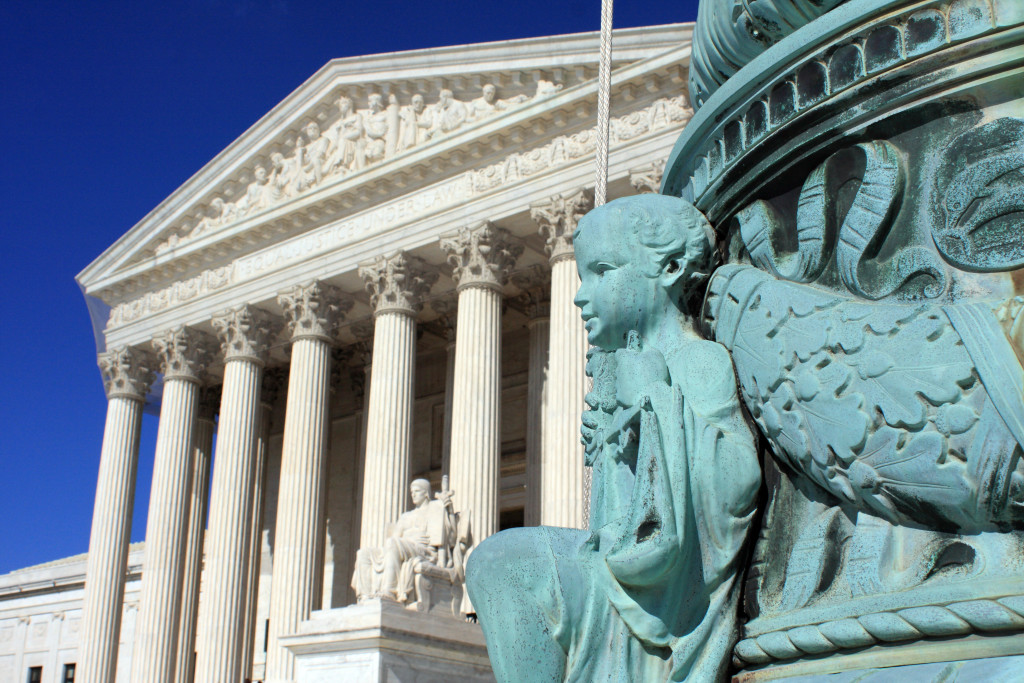
States will be able to force shoppers to pay sales tax when they make online purchases under a Supreme Court decision Thursday that will leave shoppers with lighter wallets but is a big win for states. More than 40 states had asked the high court to overrule two, decades-old Supreme Court decisions that they said cost them billions of dollars in lost revenue annually. The decisions made it more difficult for states to collect sales tax on certain online purchases. On Thursday, the Supreme Court agreed to overturn those decisions in a 5-4 ruling. The cases the court overturned said that if a business was shipping a customer’s purchase to a state where the business didn’t have a physical presence such as a warehouse or office, the business didn’t have to collect the state’s sales tax. Customers were generally responsible for paying the sales tax to the state themselves if they weren’t charged it, but most didn’t realize they owed it and few paid. Justice Anthony Kennedy wrote that the previous decisions were flawed. “Each year the physical presence rule becomes further removed from economic reality and results in significant revenue losses to the States. These critiques underscore that the physical presence rule, both as first formulated and as applied today, is an incorrect interpretation of the Commerce Clause,” he wrote in an opinion joined by Justices Clarence Thomas, Ruth Bader Ginsburg, Samuel Alito and Neil Gorsuch. In addition to being a win for states, the ruling is also a win for large retailers, who argued the physical presence rule was unfair. Large retailers including Apple, Macy’s, Target and Walmart, which have brick-and-mortar stores nationwide, already generally collect sales tax from their customers who buy online. That’s because they typically have a physical store in whatever state the purchase is being shipped to. Amazon.com, with its network of warehouses, also collects sales tax in every state that charges it, though third party sellers who use the site to sell goods don’t have to. But sellers that only have a physical presence in a single state or a few states have been able to avoid charging customers sales tax when they shipped to addresses outside those states. Online sellers that haven’t been charging sales tax on goods shipped to every state range from jewelry website Blue Nile to pet products site Chewy.com to clothing retailer L.L. Bean. Sellers who use eBay and Etsy, which provide platforms for smaller sellers, also haven’t been collecting sales tax nationwide. Under the Supreme Court’s decision Thursday, states can pass laws requiring sellers without a physical presence in the state to collect the state’s sales tax from customers and send it to the state. The National Retail Federation trade group, said in a statement that the court’s decision was a “major victory” but the group said federal legislation is necessary to spell out details on how sales tax collection will take place, rather than leaving it to each of the states to interpret the court’s decision. Chief Justice John Roberts and three of his colleagues would have kept the court’s previous decisions in place. Roberts wrote that Congress, not the court, should change the rules if necessary. “Any alteration to those rules with the potential to disrupt the development of such a critical segment of the economy should be undertaken by Congress,” Roberts wrote in a dissent joined by Justices Stephen Breyer, Elena Kagan and Sonia Sotomayor. The case the court ruled in has to do with a law passed by South Dakota in 2016. South Dakota’s governor has said his state has been losing out on an estimated $50 million a year in sales tax that doesn’t get collected by out-of-state sellers. Lawmakers in the state, which has no income tax, passed a law designed to directly challenge the Supreme Court’s 1992 decision. The law requires out-of-state sellers who do more than $100,000 of business in the state or more than 200 transactions annually with state residents to collect sales tax and turn it over to the state. South Dakota wanted out-of-state retailers to begin collecting the tax and sued several of them: Overstock.com, electronics retailer Newegg and home goods company Wayfair. The state conceded in court, however, that it could only win by persuading the Supreme Court to do away with its physical presence rule. After the decision was announced, shares in Wayfair and Overstock both fell, with Wayfair down more than 3 percent and Overstock down more than 2 percent. The Trump administration had urged the justices to side with South Dakota. The case is South Dakota v. Wayfair, 17-494. Republished with permission from the Associated Press.
SCOTUS punts on partisan gerrymandering, let maps stand for now
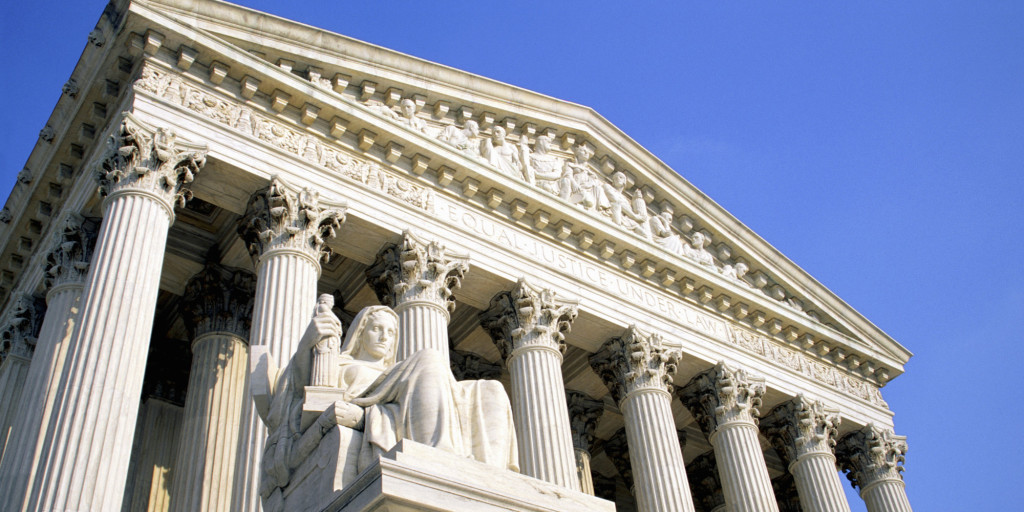
The U.S. Supreme Court (SCOTUS) on Monday essentially punted on extreme partisan gerrymandering as it declined to definitively decide whether it’s constitutional for states to create electoral maps that give an advantage to one political party over another. The court took up two cases, one out of Wisconsin and one out of Maryland. In Wisconsin, the nine justices unanimously ruled against Democrats in the landmark case that challenged the state’s legislative districts they said gave Republicans an edge in the state legislature. The SCOTUS said the Democrats failed to prove they had a right to sue statewide rather than challenging individual legislative districts. “We lack jurisdiction to decide this case, much less to draw speculative and advisory conclusions regarding others,” Chief Justice John Roberts wrote on behalf of the court. The court also decided against Maryland Republicans, saying the lower court was right to leave the current system in place. The decision dashed the hopes of political reformers who were seeking a landmark ruling to change the future of American politics. The lack of definitive ruling also leaves the door open for a third case based out of North Carolina to reach the court next term.
Supreme Court upholds Ohio decision, says states can purge voters
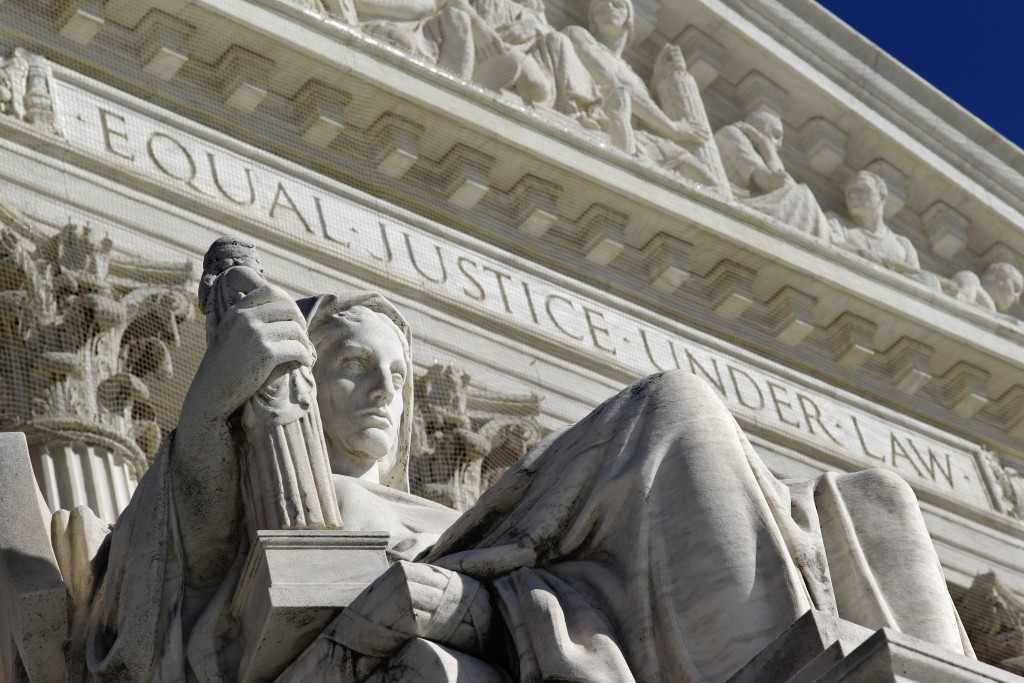
A divided U.S. Supreme Court upheld an Ohio election law giving state officials the power to purge individuals from the voters rolls who fail to vote for six years and failed to respond to notices from election officials to confirm their residency. Writing for the majority in a 5-4 decision Monday, Justice Samuel Alito wrote an estimated one in eight voter registrations in the United States are invalid or inaccurate. “A state violates the failure-to-vote clause only if it removes registrants for no reason other than their failure to vote,” Alito said. By contrast, he said, Ohio waits six years before removal, following federal law “to the letter.” Alito said Ohio’s voter removal system is not in violation of federal laws approved in 1993 and 2002 by Congress. “We have no authority to second-guess Congress or to decide whether” [Ohio’s law] “is the ideal method for keeping its voting rolls up to date,” Alito wrote. “The only question before us is whether it violates federal law. It does not.” Disagreement Not everyone agrees with the majority decision. Justice Stephen Breyer wrote an 18-page dissent. There, he argued a voter’s failure to respond to a notice “is an irrelevant factor in terms of what it shows about whether that registrant changed his or her residence.” “To add an irrelevant factor to a failure to vote, say, a factor like having gone on vacation or having eaten too large a meal, cannot change Ohio’s sole use of ‘failure to vote’ into something it is not,” penned Breyer. Alabama U.S. Rep. Terri Sewell also disagrees with the high court’s decision, saying voting is not a “use it or lose it right.” “Voting is not a use it or lose it right. It is a permanent right guaranteed by our Constitution,” explained Sewell. “The Supreme Court’s misguided decision today opens the door for states to disenfranchise voters just because they did not cast their ballot. Already we have seen the impact of this voter suppression tactic in Ohio where more than 7,000 votes were thrown out because of the state’s recent voter purge. In our democracy, your vote is your voice, and we cannot allow lawmakers to silence the voice of the people. Today, we must recommit ourselves to fighting voter suppression tactics, from voter purges to restrictive voter ID laws, wherever they exist.” Sewell is the lead sponsor of the Voting Rights Advancement Act (VRAA), legislation which would restore protections for voters in states with a recent history of discrimination. Five years after the Supreme Court’s decision to gut the Voting Rights Act in Shelby County v. Holder, the VRAA addresses a wave of voter ID laws, racial gerrymandering, and other voter suppression tactics enacted at the state level.
Alabama politicians react to Supreme Court gay wedding cake ruling
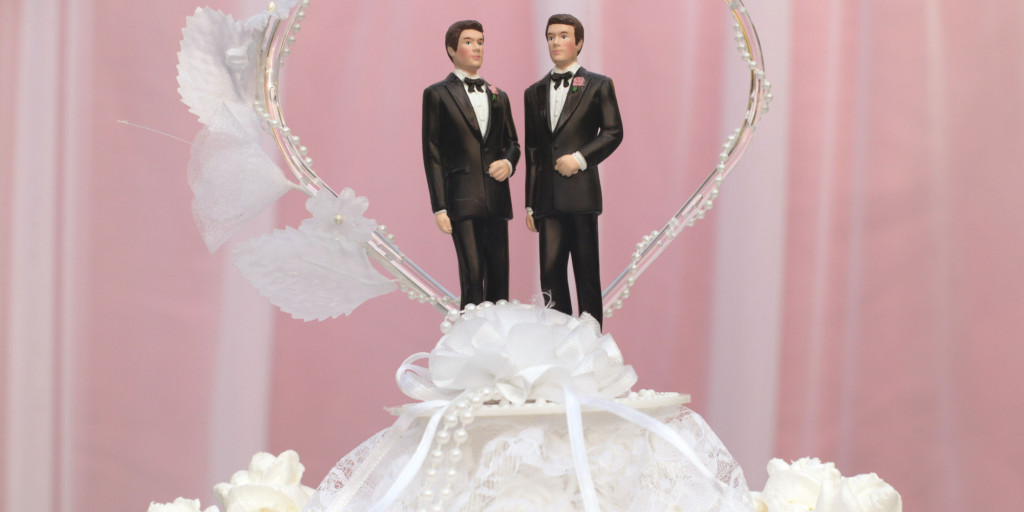
The U.S. Supreme Court narrowly ruled in favor of a Colorado baker who refused to create a wedding cake for a same-sex couple because of a religious objection. The 7-2 ruling found that the Colorado Civil Rights Commission showed hostility toward the baker, Jack Phillips, based on his religious beliefs. Here’s what Alabama politicians are saying about the decision: Alabama Attorney General Steve Marshall: This Supreme Court Decision should send a strong message to activist courts and bureaucrats alike that Americans’ right to religious expression cannot be trampled and the Constitution cannot be ignored. Alabama 1st District U.S. Rep. Bradley Byrne: This an important victory for religious liberty! It is especially notable that it is a 7 to 2 decision. That means even two of the more liberal justices agreed with the decision. Alabama 4th District U.S. Rep. Robert Aderholt: Today’s ruling by the Supreme Court is one where all Americans should be happy. This is not a time that one side should be seen as a winner and the other side as a loser. This is a win for all Americans who believe that freedom of religion is fundamental. One of the main reasons the first people from Europe came to America was for religious freedom. And that is why protecting religious liberty was one of the founding principles of the Bill of Rights. The Bill of Rights makes the United States unique among nations. Even two of the courts liberal members could not sidestep the First Amendment. This ruling was an important first round victory for religious freedom in an ongoing push-back against modern day political correctness.
Supreme Court gives victory to baker who refused to make cake for gay wedding
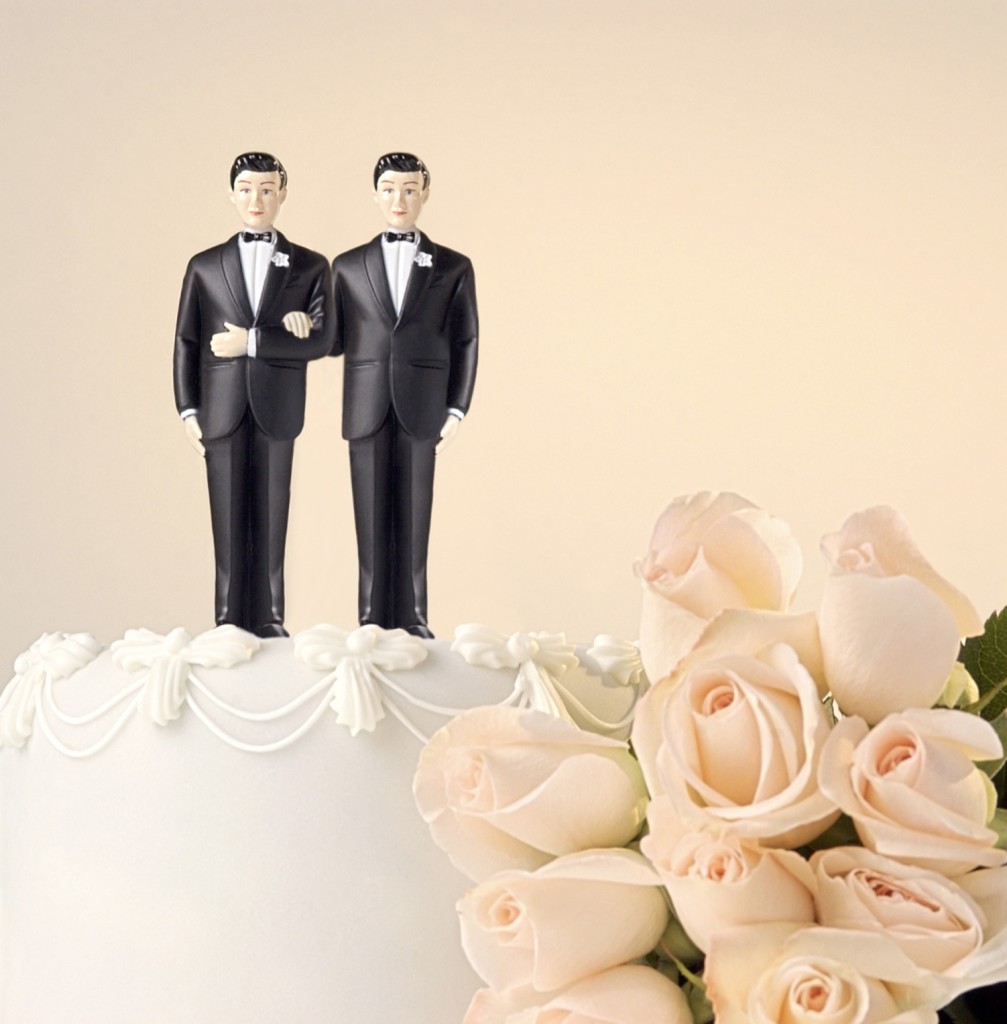
The U.S. Supreme Court narrowly ruled in favor of a Colorado baker who refused to create a wedding cake for a same-sex couple because of a religious objection. The 7-2 ruling found that the Colorado Civil Rights Commission showed hostility toward the baker, Jack Phillips, based on his religious beliefs. Justice Anthony M. Kennedy, writing for the majority, said the state commission had violated the Constitution’s protection of religious freedom in ruling against Phillips. “The neutral and respectful consideration to which Phillips was entitled was compromised here,” penned Justice Kennedy. “The Civil Rights Commission’s treatment of his case has some elements of a clear and impermissible hostility toward the sincere religious beliefs that motivated his objection.” Justices Ruth Bader Ginsberg and Sonia Sotomayor dissented. This story is breaking and will be updated.


